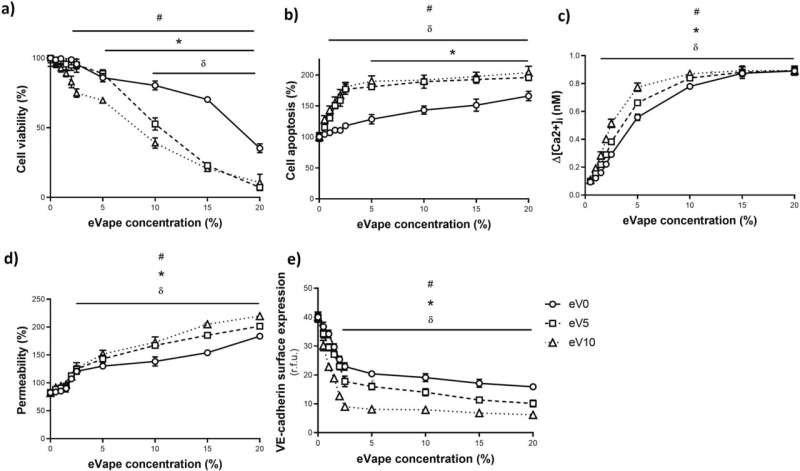This article has been reviewed according to Science X's editorial process and policies. Editors have highlighted the following attributes while ensuring the content's credibility:
fact-checked
trusted source
proofread
Even nicotine-free vapes can harm the lung, finds study

A new study has identified a protein that nicotine-free vape fluid increases in the lung, causing damage including oxidative stress, inflammation, and breakdown of the blood vessels.
The research, published in the journal Microvascular Research, demonstrated a range of damaging pathways when an in vitro model of the human lung was exposed to a common brand of nicotine-free e-cigarette.
E-cigarettes have become increasingly popular in recent years and are often seen as harmless alternatives to cigarette smoking. It is estimated that there are almost five million 'vapers' in the UK, compared to around 700,000 in 2012.
Recent studies have focused on the harm done by vapes containing nicotine, and 39 countries have banned the sale of nicotine-containing e-cigarettes, resulting in an increase in the use of nicotine-free vapes, particularly in adolescents.
The new study, carried out by Anglia Ruskin University's Biomedical Science Research group, measured the effect of vape fluid on cells in a model of a human lung. Three vapes, all watermelon flavor, were purchased from an online retailer and contained different concentrations of nicotine: 0mg, 10mg, and 20mg in a 2ml solution to mimic concentrations commonly used by the public.
The research found that even the nicotine-free vape caused oxidative stress in the lungs, increased inflammation, and the breakdown of blood vessels. This damage is similar to those found in patients with lung injury.
Data analysis revealed that a protein, ARF6, which was not previously thought to be linked to smoking or lung injury but is associated with vascular function, has a key role in regulating pulmonary microvasculature.
Lead author Dr. Havovi Chichger, Associate Professor of Biomedical Science at Anglia Ruskin University (ARU), said, "Vaping is a significant health concern considering the rising numbers of smokers, especially young teenagers, and research into its health impact is still at an early stage."
"Nicotine-free vape fluid has been demonstrated to have the same chemical composition as nicotine-containing fluid except for the absence of nicotine. As the market is not currently well-regulated, it has been difficult to judge which chemical could be the most damaging to vascular function."
"Our findings indicate that nicotine-free vape fluid exposure causes similar pro-oxidant and pro-inflammatory effects on human microvascular endothelial cells and that ARF6 is a key regulator in vape-induced damage to blood vessels."
"Further investigation is vital to identify the link between the vaping of nicotine-free e-cigarettes and the potential development of lung injury in future years."
More information: Evangelene Blackham-Hayward et al, Electronic vape fluid activates the pulmonary endothelium and disrupts vascular integrity in vitro through an ARF6-dependent pathway, Microvascular Research (2024). DOI: 10.1016/j.mvr.2024.104653



















